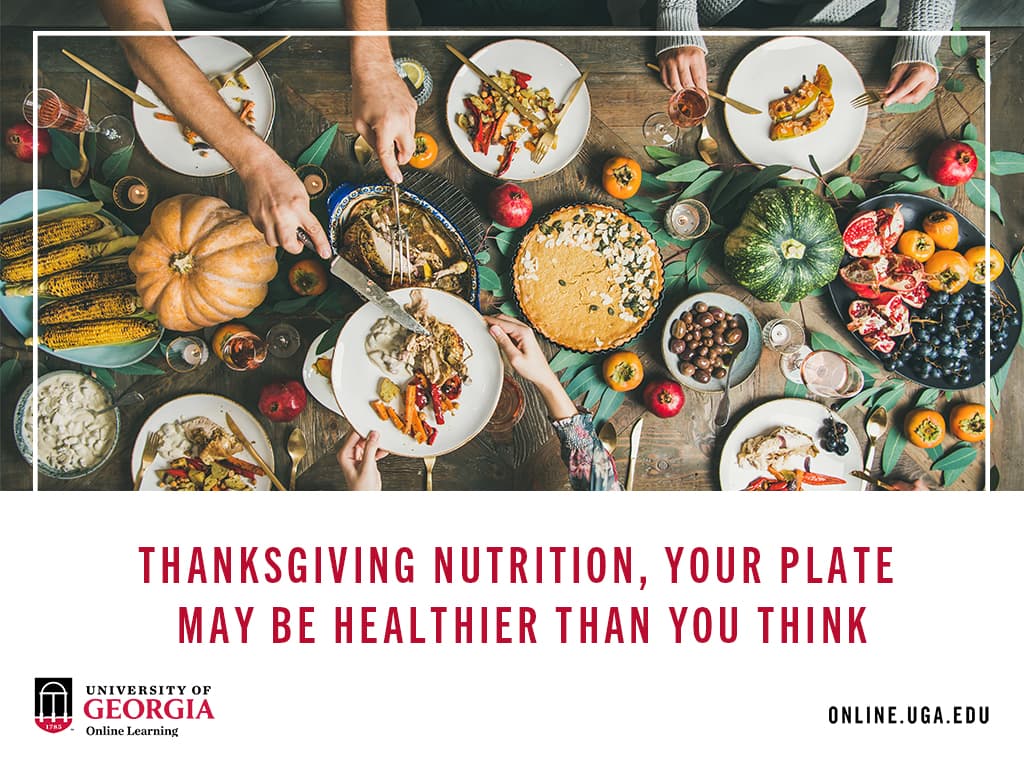Thanksgiving nutrition, your plate may be healthier than you think
Thanksgiving nutrition, your plate may be healthier than you think
This week UGA Online would like to wish all of our faculty, staff and students a Happy Thanksgiving! This is a time to celebrate with family and friends while reflecting on all of the things we have to be thankful for. Along with the celebration, food is used to bring large groups together. Although everyone knows it’s okay to splurge a little on sweet pumpkin pie or creamy mashed potatoes it is important to know exactly what you are fueling your body with.

Here are some common Thanksgiving foods along with their nutritional value:
Green Beans:
No Thanksgiving meal is complete without a side of green beans. One serving of green beans gives you 27% of your daily intake of vitamin C. You are also getting a healthy helping of vitamin A, vitamin B, calcium, and magnesium. Did you know magnesium can help your body build muscle and make you feel more energetic?
Mashed potatoes:
Who doesn’t love a tasty spoonful of mashed potatoes? Well, you should know that in that spoonful you are also getting a lot of nutrition. Potatoes are a good source of vitamin C. One medium sized potato provides 45% of your daily vitamin C intake. Potatoes are rich in vitamin A, iron, and vitamin B. Try a recipe without salt or butter. Mashed potatoes are really flavorful on their own or with green onions or parsley on top.
Turkey:
Let’s take a closer look at the centerpiece of the average Thanksgiving meal – the turkey. As you may have guessed, turkey is a good source of protein, but also potassium. In a three ounce serving of skinless turkey breast you can get up to 25 grams of lean protein. You may not have known however, that turkey also has vitamin B, iron, and phosphorus.
Tofu:
Interested in going meatless as a possible new year’s resolution? Try it out on Thanksgiving by substituting tofu for your turkey. Tofu can be cooked in a variety of flavorful ways and comes with a ton of nutritional benefits including a lot of calcium, iron, magnesium, vitamin B, and protein.
Now that we have talked about Thanksgiving Day, we should discuss a common issue for every family who celebrates Thanksgiving – leftovers. In order to prevent your food from going bad, the USDA recommends placing leftovers in your refrigerator or freezer within two hours of the meal being cooked. Please note – you don’t have to wait for your food to be at room temperature to refrigerate it. As soon as you are done eating, it’s good to refrigerate it as soon as possible.
Once refrigerated, the USDA recommends you eat your leftovers within 3-4 days to prevent spoilage. However, if you freeze your food it can last between 2 and 6 months.
Online UGA offers a Masters in Foods and Nutrition program offered through the College of Family and Consumer Sciences, which is designed for working professionals and those who wish to broaden their knowledge in the field of nutrition.
Read the original article here.
